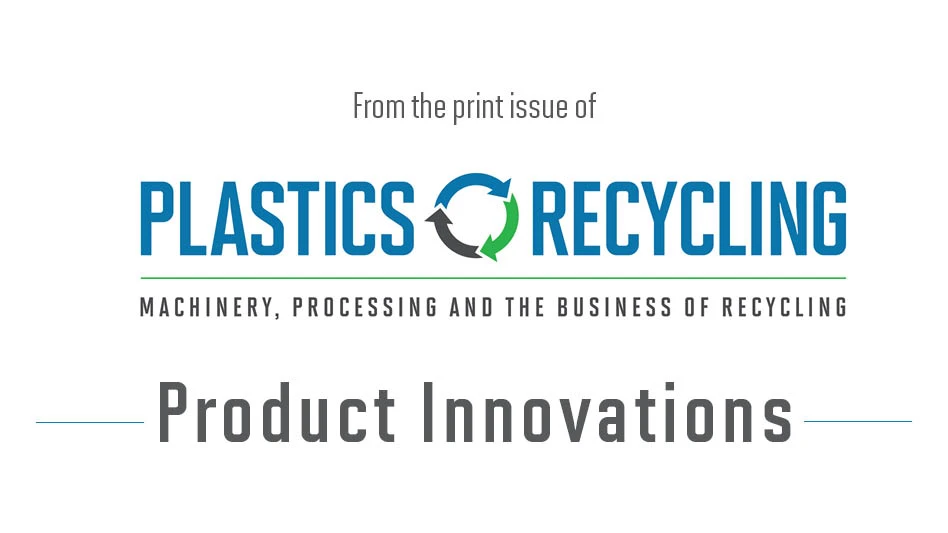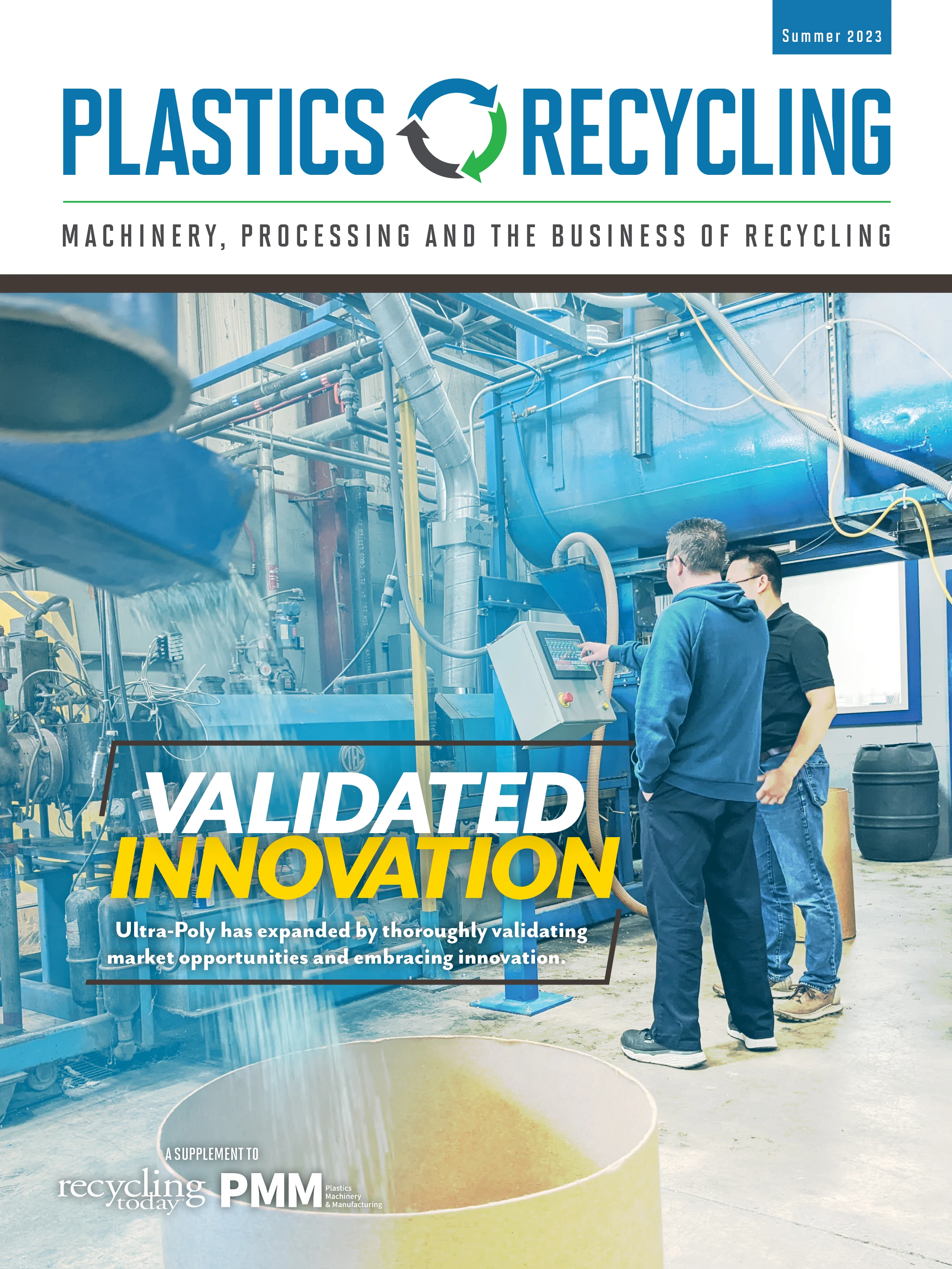

Genox GCV combines shredder, granulator
GCV series: This new size-reduction combination from Genox USA features a shredder mounted on top of a granulator. It combines a V-series single-shaft shredder and a GC-series granulator in a compact, single unit that eliminates the need for conveyors. Four models are in the GCV series. The smallest is the GCV600T, which has a shredder with a 47.2-inch-by-42.9-inch hopper opening, a 23.6-inch-by-19.7-inch chamber size, a 24-horsepower (hp) main drive motor and 3-hp hydraulic power pack. The largest model is the GCV1200T, with a hopper opening of 74.8 inches by 56.3 inches, a shredder chamber measuring 47.2 inches by 32.1 inches, a 74-hp main drive motor and a 7-hp power pack unit. Genox says the GCV series can handle plastic scrap, large plastic frames, purge, pipes and cable.
What’s new? The GCV series, which is the first combination unit from Genox.
Benefits: Energy efficiency and lower upfront investment costs, thanks to the series’ compact footprint and conveyor-free operation. Each machine has motor-load monitoring. Cutting chambers on the shredder and the granulator are easily accessible for maintenance. The controls also are integrated, and rotor designs are customizable for different materials.
Genox USA, Saint Petersburg, Florida, 724-960-1146, www.genoxusa.com

Conair GP shredders are compact and affordable
GP-series shredders: So-called because they are designed for general-purpose (GP) applications, these single-rotor shredders are designed to handle small to moderate throughput of purgings, pipe and profile scrap or sheet scrap. They are available in two models: the GP 924, which has a 24-inch cutting chamber; and the GP 935 with a 35-inch chamber. The rotor on both models is made of 8.7-inch-diameter steel and is equipped with four-sided, indexable cutting knives that cut against a fixed-blade knife with dual cutting edges. Both the fixed-blade and indexable blades can be unbolted and rotated to keep a fresh edge between sharpening. The shredders have a large, open-top infeed hopper that can accommodate gaylord-sized batch feeds and a low-maintenance hydraulic ram to drive scrap into the cutting chamber.
What’s new? The GP series.
Benefits: Compact size and affordability. The GP series was designed to serve as an entry-level line of shredders for processors that need to reduce hard scrap too large for a granulator at a lower throughput and price than a larger shredder. It also delivers the reliability and low-maintenance service usually only seen on larger equipment. The shredders offer high cutting torque at relatively low rotor RPM, allowing them to cut even thick scrap with limited noise.
Conair Group, Cranberry Township, Pennsylvania, 724-584-5500, www.conairgroup.com/product/gp-plastic-shredders

Flexicon conveyor is easily moved, cleaned
Mobile tilt-down flexible screw conveyor: This flexible screw conveyor from Flexicon is transported easily between work sites and wash-down stations and has a variety of screws appropriate for free- or nonfree-flowing materials. It has a low-profile hopper with a bag-support tray and a manual hydraulic jack for raising and lowering the conveyor assembly. Constructed of 16 stainless steel, it has a quick-release clean-out cap, allowing the conveyor to move corrosive materials and be washed down easily.
What’s new? A design change that puts the support boom parallel to and in contact with the conveyor tube.
Benefits: Ease of mobility, positioning and cleaning. The conveyor’s tilt-down design makes moving it under doorways and mezzanines easier, and its low center of gravity maximizes its stability. The tilt-down ability allows the discharge point to be positioned between process equipment inlets and overhead obstructions and, when fully lowered, the clean-out cap conveyor discharge easily can be reached from standing height, making cleaning and inspection tasks easier.
Flexicon Corp., Bethlehem, Pennsylvania, 610-814-2400, www.flexicon.com

PlasTell now identifies more plastic materials
PlasTell: Equipped with a near-infrared scanner, this device for identifying plastics has applications for a wide range of users, including polyethylene terephthalate processors and compounders. Recyclers—among Matoha Instrumentation’s biggest customers—can use the device to spot-check materials, segregate clumped plastics or train workers to identify plastics. Users can view statistics and save data about the materials the device identifies.
What’s new? An upgraded version of the PlasTell, which Matoha launched in 2019. In March, the company released a new version, PlasTell Pro, capable of identifying even more plastic and rubber materials, including polybutylene terephthalate, thermoplastic polyurethane and polyvinyl chloride. The new version is battery powered to make it more portable than previous versions.
Benefits: Proper identification of plastics so they can be processed or recycled correctly. Using the device is easy and safe, and the results—which are generated in less than 1 second—are reliable. The device can identify all the most common plastics, including polyethylene, polypropylene, polystyrene, polycarbonate and acrylonitrile butadiene styrene.
Matoha Instrumentation Ltd., London, 44-786-863-9607, www.matoha.com, www.youtube.com/watch?v=6kPv1_ByLsw

High-performance Queo materials join Bornewables line
Queo: Borealis Compounds Inc., part of Vienna-based Borealis AG, produces a wide range of recycled polymers in its Bornewables portfolio of circular polyolefins. These materials are made from sustainably sourced, renewable feedstocks, such as used cooking oil and residues from vegetable oil processing. All Bornewables polyolefins are recognized with International Sustainability and Carbon Certification (ISCC Plus).
What’s new? Queo, a range of high-performance polyolefin plastomers and elastomers that are part of the Bornewables portfolio. Queo received ISCC Plus certification in March.
Benefits: Sustainably sourced polyolefins that match the performance of conventional plastics, such as polyethylene, without requiring a fossil-based source. Queo products can be used in automotive and houseware parts, wire and cable applications and flexible and rigid packaging. The company says Queo materials exhibit exceptional sealability, flexibility, compatibility and processability properties.
Borealis Compounds Inc., Houston, 908-850-6200, www.borealisgroup.com

Pellenc QC+ checks for contaminants
QC+: Developed by Pellenc ST specifically for the refuse-derived fuel industry, this quality-control machine can be used by recyclers to check moisture content as well as levels of polyvinyl chloride (PVC) and chlorine—major contaminants in plastics recycling—in their material streams. It is equipped with Pellenc’s Central Nervous System, or CNS, software platform, designed for users to manage their material streams through customized reports and alerts and to integrate future technologies and sensors.
What’s new? The system, released within the past year.
Benefits: Identification and elimination of PVC and chlorine from the recycling stream and flexibility to fit into tight spaces. The QC+ can be integrated and upgraded and is available in either a gantry or conveyor version. It can be assembled in a modular way on a straight or inclined plane, and its cabinet can be offset to accommodate users’ space constraints.
Pellenc ST America, Charlotte, North Carolina, 803-965-0980, www.pellencst.com

Explore the Summer 2023 Plastics Recycling Issue
Check out more from this issue and find your next story to read.
Latest from Recycling Today
- BMW Group, Encory launch 'direct recycling’ of batteries
- Loom Carbon, RTI International partner to scale textile recycling technology
- Goodwill Industries of West Michigan, American Glass Mosaics partner to divert glass from landfill
- CARI forms federal advocacy partnership
- Monthly packaging papers shipments down in November
- STEEL Act aims to enhance trade enforcement to prevent dumping of steel in the US
- San Francisco schools introduce compostable lunch trays
- Aduro graduates from Shell GameChanger program





